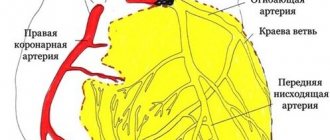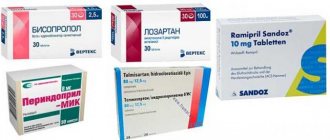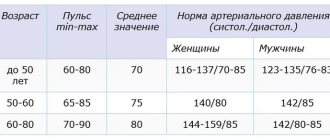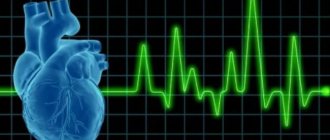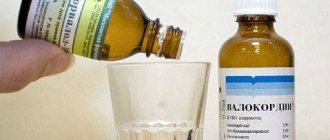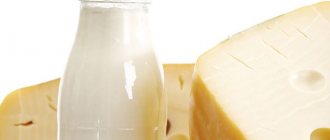Most people are accustomed to the fact that a cough is a companion to a cold or allergy. Could a cough be caused by the heart? Yes, because with cardiac pathologies, the synchronous functioning of the ventricles of the heart may be disrupted. The right one actively fills the lung tissue with blood, while the left one pumps it out more slowly. This provokes poor blood circulation and increased pressure in the lungs, which causes hypoxia. The patient constantly wants to cough and inhale more air, and most often the cough is dry. In such cases they talk about cardiac cough.
Causes of cardiac cough
One of the common symptoms of heart pathologies associated with lung function is shortness of breath. It can be felt already in the early stages of the disease. You can often notice that people with shortness of breath during physical or emotional stress begin to cough. This is the so-called “cough from the heart.”
This type of cough owes its origin to functional disorders of the heart muscle. Coughing in heart disease is a fairly common occurrence, because the heart muscle and its main vessels are closely connected to the lungs and bronchi.
Disturbances in blood flow in the pulmonary circulation can manifest themselves to varying degrees: at an early stage they can cause a slight cough, and in an advanced state – pulmonary edema. This is the most severe manifestation of heart failure and is associated with cough. In this case, the patient requires urgent medical attention. Now you have a unique opportunity to undergo a free consultation with a specialist and a set of preparatory examinations when enrolling in a course of enhanced external counterpulsation or shock wave therapy of the heart:
Promotion
Just until the end of autumn, undergo a free consultation and a set of preparatory examinations* when registering for a course of enhanced external counterpulsation or shock wave therapy of the heart.**
Send a request
* Check the details of the Promotion by phone. **Has contraindications; consultation with a doctor is required.
Enhanced external counterpulsation (EECP) Cardiac shock wave therapy (SWTS)
Hurry up to apply, the promotion period is limited.
Hidden symptoms
There are also atypical symptoms, which many do not pay attention to, wasting time. For example, chest pain is not the only variant of an attack caused by a malfunction of the heart muscle. There is a variant of the so-called abdominal form. It occurs predominantly in women. The pain in this case is determined throughout the abdomen or collects under the ribs on the right side. At the same time, heartburn, nausea, vomiting, which does not bring relief, and flatulence appear. Doctors even compare the clinical picture to an “acute abdomen.”
Another atypical option is the asthmatic form. There may be no pain at all. The main symptoms include a cough with pinkish frothy sputum, suffocation, and shortness of breath. The patient has to breathe frequently, and this is difficult for him. It is difficult for him to lie horizontally; it is most comfortable to be in a semi-sitting position.
The arrhythmic form of a heart attack also manifests itself predominantly without pain or against the background of minor pain. The main symptom is tachycardia.
The disease of the dissatisfied. What symptoms indicate the onset of heart problems Read more
How does cough occur in heart disease?
Weak functioning of the left ventricle and the pathological processes occurring in it are the main cause of cardiac cough. In this case we talk about left ventricular failure. It leads to deterioration of blood circulation in the pulmonary arteries, sclerosis of small vessels, and increased pressure in the lungs. Their tissues do not have enough oxygen - this is why the patient experiences shortness of breath and suffocates. In turn, problems in the pulmonary circulation aggravate the condition of the heart muscle.
One of the symptoms of cough in heart failure is hemoptysis. This phenomenon also has its own reason: since the volume of blood in the lungs exceeds the normal level, its excess accumulates and comes out of the bronchi when coughing. After all, a cough is a natural reaction of the body when the lungs, bronchi, and alveoli become overfilled with fluid or a foreign body enters them.
A cardiac cough almost always manifests itself at moments when the patient is exposed to physical exertion. However, if the cardiac dysfunction is quite severe, the patient only needs to take a lying position to start choking from coughing. In this case, excess fluid begins to intensively fill the lungs, causing irritation and continuous coughing.
Development in advance
Sometimes a heart attack can take an extremely long time to develop—about a month. In this case, the approaching threat may manifest itself as the following harbingers.
A person suffers from fatigue and constant drowsiness. Vessels that are constantly under stress are in a state of tone, that is, they are predominantly narrowed. This means that the body lacks oxygen and nutrition. The nervous system especially reacts to such a shortage. As a result, symptoms such as drowsiness, melancholy and fatigue begin to develop, for which at first glance there is no reason.
Another sign is shortness of breath. If one organ malfunctions, in this case the heart, problems begin in the functioning of the lungs, the gas exchange process is disrupted, and breathing becomes intermittent.
A few days before the attack, many people experience a feeling of internal coldness and begin to shiver. Often even such a condition is confused with ARVI, but if the condition is caused by problems with the heart, the body temperature will be normal. It is also worth remembering cases of hereditary history, and if problems with the heart and blood vessels were observed in relatives, it is worth visiting a doctor even for the purpose of prevention.
The many faces of anxiety. How a panic attack differs from a heart attack Read more
Cough due to heart failure
Heart failure is an extremely common disease associated with blood stagnation due to impaired circulation in large vessels. In most patients, this pathology is accompanied by shortness of breath and cough, which has the origin described above.
The nature of the cough can be different:
- paroxysmal and dry;
- exhausting and loud;
- irritating dry;
- sharp and short.
A cardiac cough can be a persistent problem for people with chronic heart failure . It occurs during times of physical or emotional stress and is usually characterized as dry and jerky.
In acute heart failure, a cough may begin with shortness of breath at night, which turns into suffocation due to the overfilling of the lungs with fluid. When breathing, the lungs begin to make bubbling sounds. The patient may cough producing bloody, frothy sputum due to a rapid increase in sputum volume in the lungs.
Acute phase
An acute heart attack is characterized by symptoms such as severe weakness, dizziness, and acute pain in the chest. In this case, it can radiate to the shoulder blade, neck or jaw. The pain does not go away after taking the pills. Indirect evidence of the development of cardiac pathology in such a situation can be cold sweat, shortness of breath and weakness.
The effect of surprise. Who is at risk for sudden cardiac death syndrome Read more
Symptoms of cardiac cough
Most often, patients in the early stages of developing heart pathologies are alarmed by a dry cough that lasts a long time and is not associated with colds. Pain in the heart when coughing is a clear sign of problems in the functioning of this organ and a signal about the need to start treatment.
Subsequently, coughing attacks begin to overcome the patient even with minimal physical exertion and at night, often accompanied by the release of foamy sputum with traces of blood. This is why many heart patients sleep sitting up.
Other common symptoms include:
- increased heart rate;
- weakness and loss of consciousness;
- lack of air;
- swelling of the veins in the neck;
- bubbling in the lungs audible from a distance.
As already mentioned, a cardiac cough is almost always accompanied by shortness of breath. Unlike bronchitis, a cardiac cough rarely produces sputum. It also differs from a smoker's cough, which has a barking character.
Causes and course of the attack
A heart attack is essentially a violation of the blood circulation of the myocardium, when necrosis of the muscle tissue of the heart can subsequently develop. The attack can be lightning fast - in this case, serious complications appear that require immediate resuscitation measures. Depending on the degree of narrowing of the coronary arteries, the attack may last longer.
As a rule, most often a heart attack develops due to problems with the cardiovascular system. First of all, this is atherosclerotic damage to the arteries. Age is an important factor; in the elderly, the risks of developing pathology increase significantly, as functional changes in the functioning of the heart and blood vessels affect. Although recently there has been a rejuvenation of cardiac incidents. An attack lasting more than 30 minutes can be considered a manifestation of myocardial infarction.
Before and after the disaster. What to do if you have a heart attack Read more
A heart attack can develop against the background of angina pectoris. This is one of the forms of coronary disease, in which paroxysmal pain appears in the heart area. They develop against the background of insufficient blood supply to the myocardium. Angina is provoked by a number of reasons: physical and emotional overload, bad habits (especially smoking, alcohol).
In addition, factors such as diabetes and long-term use of a number of drugs, including non-steroidal ones, can trigger a heart attack.
Treatment of cardiac cough in the elderly with folk remedies
Traditional medicine can be used to treat serious diseases after consultation with a specialist. Decoctions and tinctures may not only not have any therapeutic effect, but also aggravate the patient’s condition. It is important to remember that any treatment of cardiac cough in older people with folk remedies should be under the supervision of a cardiologist.
Alternative medicine offers the following herbal infusions and tinctures to normalize disrupted vital processes and restore the patient’s health:
- 1 tbsp. l. pour 0.5 liters of hot water over calendula flowers, leave for 1 hour, pass through cheesecloth. It is recommended to consume the entire decoction during the day. Course - 21 days.
- Combine alcohol tinctures of motherwort and hawthorn fruits in equal parts. Single dose - 25 drops, drink 2 times a day (in the morning - on an empty stomach, in the evening - before meals). The course is at least 1 month.
- Pour 50 g of the medicinal herb mountain ram into a container with 0.5 liters of vodka. Leave in a cool, dark place for 2 weeks. Drink 15 drops twice a day, in the morning and evening. Course - 20 days. Dry peppermint leaves can be infused in the same way. The course and dosage are the same.
To treat cardiac cough in older people, folk remedies can also be used:
- Birch leaves.
4 tsp. pour the crushed raw materials into a container with 0.4 liters of boiling water. Leave in the dark for 1 hour, then pass through cheesecloth and add 1 tsp to the broth. soda Drink the resulting infusion 1 glass every 6 hours.
- Valerian root.
Before use, chop the raw material and pour it in the amount of 2 tsp. into a container with 400 ml of hot water. Leave in a dark place for 1-1.5 hours. Strain and drink 30 ml every 8 hours. The duration of treatment is 10-14 days.
- Strawberry leaves and berries.
Pour 40 g of raw material into a saucepan, add 0.4 liters of water, put on fire and boil for 10 minutes. Pass through cheesecloth and leave to cool. Drink 30 ml every 8 hours.
- Lily of the valley flowers.
To prepare the decoction you will need 4 tsp. raw materials. Place it in a container with 1 liter of boiling water. Leave in the dark for 1 hour. Drink 30 ml every 8 hours.
- Oat decoction.
Pour 0.5 cups of unprocessed grains into 0.5 liters of boiling water and place the container on the fire. Bring the liquid to a boil and leave to cool. Then pour 4 tbsp into the cooled broth. l. chopped elecampane root, bring to a boil again. Leave for 4 hours in the dark, pass through a filter, or sweeten with honey.
Store the decoction in a cool place, take 0.5 cups before meals 3 times a day for 2 weeks.
- Tincture of viburnum berries
Ripe fruits are ground, placed in a jar, poured with 1 glass of hot water, left for 1 hour, filtered. For therapy to bring maximum results, you should take the tincture for at least a month, twice a day, 0.5 cups. The treatment course is recommended every 3 months.
We recommend
“Private nursing home in Moscow: features, selection criteria, cost of living” Read more
Soothing collection of medicinal herbs: lemon balm, yarrow, valerian
All components are thoroughly crushed and combined in one container. As needed, the decoction is prepared as follows: 1 tbsp. l. pour 0.5 liters of water at room temperature into the mixture and leave for 4 hours. Then the container is placed on the fire, the liquid is boiled, and filtered. Take a sip during the day, daily dose - 1 glass, course - 1 month.
- Pumpkin pulp to eliminate swelling or prevent it.
Grind 500 g of the fruit and eat it raw or drink the squeezed juice. Regular consumption of pumpkin is indicated for elderly patients with heart pathologies.
- Lemon garlic syrup.
Pass 5 heads of the spicy vegetable plant through a press, squeeze 5 citrus fruits into the resulting pulp, add 500 g of honey, seal, and put in the pantry for 10 days. Use 1 tsp. before meals 4 times a day.
Treatment
Therapy depends entirely on the specific nosology. Infectious endocarditis and pericarditis are treated with drugs, but tumors or defects require surgical intervention, otherwise the child will grow, and with it pathological holes (or neoplasms) in the organ, which will lead to death.
Conservative treatment
Non-drug methods are recommended for all patients with a predisposition to or presence of cardiac problems. They include:
- normalization of work and rest regimes;
- 8 hours sleep;
- regular moderate physical activity;
- control of salt intake;
- weight loss (if you are overweight);
- avoiding alcohol and smoking;
- changing your diet towards proper nutrition.
Specific drug therapy depends on the cause of cardiac dysfunction. Main groups of drugs:
- Antibiotics (for bacterial etiology);
- Antihypertensives (Beta blockers, diuretics, ACE inhibitors and angiotensin II receptor blockers dilate blood vessels to lower blood pressure);
- Cardiac glycosides (to restore cardiac conduction and contractility);
- Nonsteroidal anti-inflammatory drugs (suppress inflammation);
- Immunosuppressors (for autoimmune processes), etc.
Surgery
The surgeon restores the heart rhythm by implanting a pacemaker. The batteries for it are changed every 5-7 years during repeated surgery.
All affected valves are replaced with artificial ones. In severe cases, a heart transplant is required.
Cough in older people
Features of cough in older people
Cough in older people can be a symptom of serious illnesses, and it is not as easy to deal with as it is in younger people.
In an aging body, all organs are subject to degenerative-dystrophic changes, including the respiratory tract. These are the changes:
* weakening of muscles and mobility of costal cartilages;
* weakened immunity, atrophic changes in the epithelium, narrowing of the bronchi, pneumosclerosis;
* decrease in lung volume, decrease in tissue elasticity;
* decrease in oxygen in the blood due to decreased passage of gases through the alveoli.
As a result, many organs, including the lungs, do not perform their functions fully. This leads to the accumulation of sputum, which is cleared only when the person is in a lying position; in other cases, the mucus causes a severe cough.
In addition to infectious respiratory diseases, chronic bronchitis, tuberculosis and cancer, other causes of cough in older people include:
* allergies - it is necessary to identify the allergen and take antihistamines.
* gastroesophagitis - requires treatment of the gastrointestinal tract.
* excess body weight – measures aimed at weight loss are necessary, including regular performance of a feasible set of physical exercises.
* disturbances in the functioning of the heart - this requires observation and treatment by a cardiologist.
Heart cough
In heart failure, blood stagnates in the pulmonary circulation. As a result, swelling of the lung tissue occurs and a cough appears, called in medicine cardiac bronchitis.
The initial symptoms of cardiac cough in the elderly are similar to bronchitis, but it differs in that it is dry, unlike a cold. As the disease progresses, blood clots may appear, frightening the possibility of cancer.
Cardiac cough in the elderly can be caused by the following reasons:
- arterial hypertension , in which sputum accumulates at night. Attacks of hysterical cough occur in a quiet position or with little physical activity and do not stop until the sputum is completely discharged;
- heart failure (left ventricular) . Due to lack of air, long-lasting attacks, up to an hour and a half, occur. Physical activity worsens the cough and can cause hysterical attacks of sputum production. At night the cough is painful, although not severe;
- heart valve defects - cause a cough with increased sputum production at the slightest physical exertion, accompanied by dizziness, weakness, and increased sweating. Possible pain and hemoptysis;
- endocarditis and pericarditis - the dry cough that occurs with these diseases causes heart pain;
— implanted pacemaker.
To distinguish cough due to heart failure from other diseases, it is necessary to pay attention to symptoms such as palpitations, shortness of breath, and possible loss of consciousness.
The person breathes hoarsely and intermittently, sometimes with painful shortness of breath. As the disease progresses, symptoms are present even at rest, and the person may be forced to sleep in a sitting position due to shortness of breath. Such patients lose weight and feel constantly tired.
Dry cough in older people
Elderly and senile people can have several diseases at the same time, and cough is sometimes caused by several causes.
Dry cough in the elderly can be caused by medications used: non-selective beta blockers, powder inhaler and others.
How to distinguish a dry cough in heart failure from a cold or caused by taking medications?
In an elderly person with heart failure, the cough worsens when lying down; sputum is not coughed up; Blood clots may appear in advanced cases.
A dry cough in older people can occur with exacerbation of bronchitis, as well as with pneumonia, whooping cough, and lung cancer. This cough often manifests itself in the form of painful, protracted attacks that do not bring relief.
Sometimes older people cough while eating. The most common reason for this is lack of teeth and poor chewing of food, swallowing large pieces of food. Cough may be caused by stomach diseases: ulcers, gastroesophagitis. With gastroesophagitis, stomach contents reflux into the esophagus, receptors are irritated, and a cough occurs. Causes of coughing while eating can be asthma, dehydration, obesity, and respiratory diseases.
Cough in bedridden elderly people (congestive pneumonia)
In bedridden elderly people, there is an accumulation of pulmonary fluid and mucus due to muscle weakness and cardiac failure. This leads to a prolonged hacking cough. When a small amount of sputum is expelled, the person feels better.
If the patient cannot cough up a large amount of accumulated sputum, it stagnates, microorganisms develop in it, and congestive pneumonia occurs.
Treatment in this case is aimed at eliminating the infection, restoring ventilation, and reducing swelling of the lung tissue.
In treatment they use:
* antibacterial, expectorant, antioxidant drugs;
* metabolism to improve heart function;
* therapeutic exercises, inhalations, oxygen therapy are necessary.
Physiotherapy
To prevent congestive pneumonia, a bedridden patient needs chest massage, frequent position changes, and regular breathing exercises to improve lung ventilation.
Features of treatment in elderly people
For older people, it is very important to select medications depending on the diseases they have. To do this, you must definitely visit a doctor. Even if this is a symptom of a common cold, only a doctor can choose the right treatment taking into account the general health of the elderly patient. Senile cough should be treated with drugs with dose adjustments according to age, taking into account changes in filtration in the kidneys.
In older people, immunity is reduced, sputum is difficult to clear, and this is a very significant risk factor for the development of pneumonia.
Drug therapy in geriatric practice involves the prescription of mucolytics - drugs that dilute sputum and promote its elimination (bromhexine, lazolvan, ACC, etc.).
When taking these medications, you must strictly follow the dosages prescribed by your doctor.
Antitussive drugs should not be taken simultaneously with mucolytics. Sputum should come out freely. For older people, the use of expectorants is recommended in the form of inhalations. This allows you to use the drugs more effectively and reduce the effect of drugs on the kidneys and liver.
Nebulizers (compressor inhalers) are very suitable for these purposes. The medicinal substances, broken down into the smallest dust, enter the smallest areas of the bronchi. The nebulizer can be filled with ordinary saline solution (sodium chloride) or alkaline mineral water and the required dose of mucolytic can be added to them. As a rule, sputum comes out very well.
Along with mucolytics, antihistamines (loratadine, suprastin, tavegil, etc.) are prescribed to eliminate the allergic factor.
To speed up recovery, older people are also prescribed vitamin preparations.
In case of high fever and severe condition, the doctor may prescribe antibiotics.
Geriatrician of the Institution “6th Central Regional Clinical Hospital of the Leninsky District of Minsk” Britsko Natalya Afanasyevna
How to distinguish cardiac from pulmonary dyspnea
The real cause is accompanied by symptoms of the disease that provoke dyspnea, which can be:
- Acute – develops within a few minutes
- Subacute – develops over several hours or days
- Chronic – persists for several weeks or months
When an acute form is observed, it is necessary to urgently call an ambulance.
The tables show precipitating diseases and their symptoms, as well as recommendations for medical care. This will help determine the type of shortness of breath and take appropriate measures.
Pulmonary dyspnea - causes and signs
| Disease | Symptoms | Health care |
| Asthma | Wheezing, which begins spontaneously, is accompanied and caused by exposure to provoking factors (upper respiratory tract infections, allergens, cold air, physical activity) | Examination by a doctor to determine the respiratory rate and functionality of the respiratory tract |
| Pneumothorax | Suddenly the respiratory rate is disrupted and acute chest pain appears. Often occurs spontaneously, as well as after injury and in people with COPD | Chest X-ray |
| Pulmonary embolism | Spontaneous chest pain that worsens with inspiration, rapid heart rate and breathing | Examination using CT and angiography |
| Pulmonary hypertension | Gradually increasing intensity of shortness of breath, cough, weakness, swelling of the legs | Echocardiography, cardiac catheterization |
| Restrictive diseases | Difficulty in breathing appears against the background of professional activities associated with prolonged inhalation of irritants | Chest X-ray, pulmonary function test |
| Exacerbation of COPD (chronic obstructive pulmonary disease) | Productive or nonproductive cough (with or without sputum), inhalation and exhalation through pursed lips, wheezing with whistling | Examination by a doctor, chest x-ray |
| Pneumonia | Sharp chest pain when inhaling, fever, cough, weakness, unusual noises in the lungs | Examination by a doctor, chest x-ray |
| Obstructive pulmonary disease | Violation of respiratory rate provokes heavy smoking, a history of emphysematous chest | Chest X-ray, respiratory function tests |
Cardiac dyspnea - causes and signs
| Disease | Symptoms | Health care |
| Heart failure, ischemic heart disease |
|
|
| Infarction or acute myocardial ischemia | A feeling of deep pressure in the chest, which may be accompanied by pain radiating to the jaw or arm | Electrocardiography, cardiac catheterization, blood tests |
All three forms of shortness of breath require consultation with a cardiologist, pulmonologist, endocrinologist or other specialists who will prescribe an appropriate examination and select the correct treatment methods.
Sources:
- “Diseases of the lungs and respiratory tract. Symptoms of lung diseases. Dyspnea,” MSD Manual
- “How to understand the “language” of shortness of breath?”, Atmosfera magazine. Pulmonology and allergology", No. 4, 2012
- “Treatment of shortness of breath in patients with end-stage cardiovascular and pulmonary diseases from the perspective of evidence-based medicine,” Journal of Palliative Medicine and Rehabilitation, No. 2, 2005
- “Dyspnea: pathophysiological and clinical aspects”, Journal “Therapeutic Archive”, No. 3, 2005
When to ask for help
Naturally, in the acute phase you need to seek help immediately. In other situations, if some atypical health problems begin that are embarrassing, you should not try to treat yourself. It is necessary to consult a doctor - a therapist or cardiologist. Moreover, you should not practice folk remedies - you can simply waste time. Those who have people in their family suffering from heart disease should be especially attentive to themselves. After all, hereditary risks in the development of cardiovascular pathologies are quite high.

